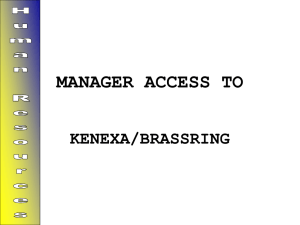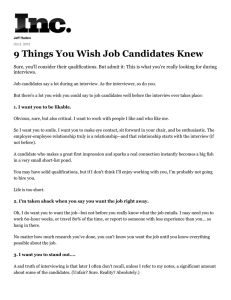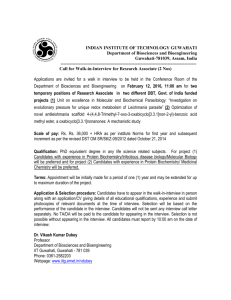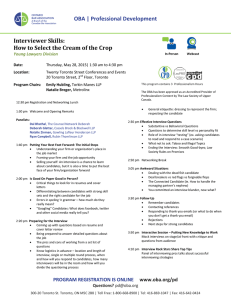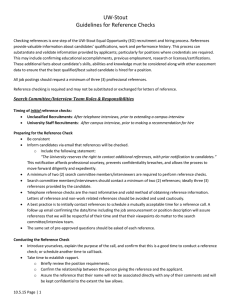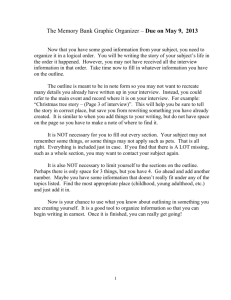Where Do I Start? - West Yorkshire Joint Services
advertisement
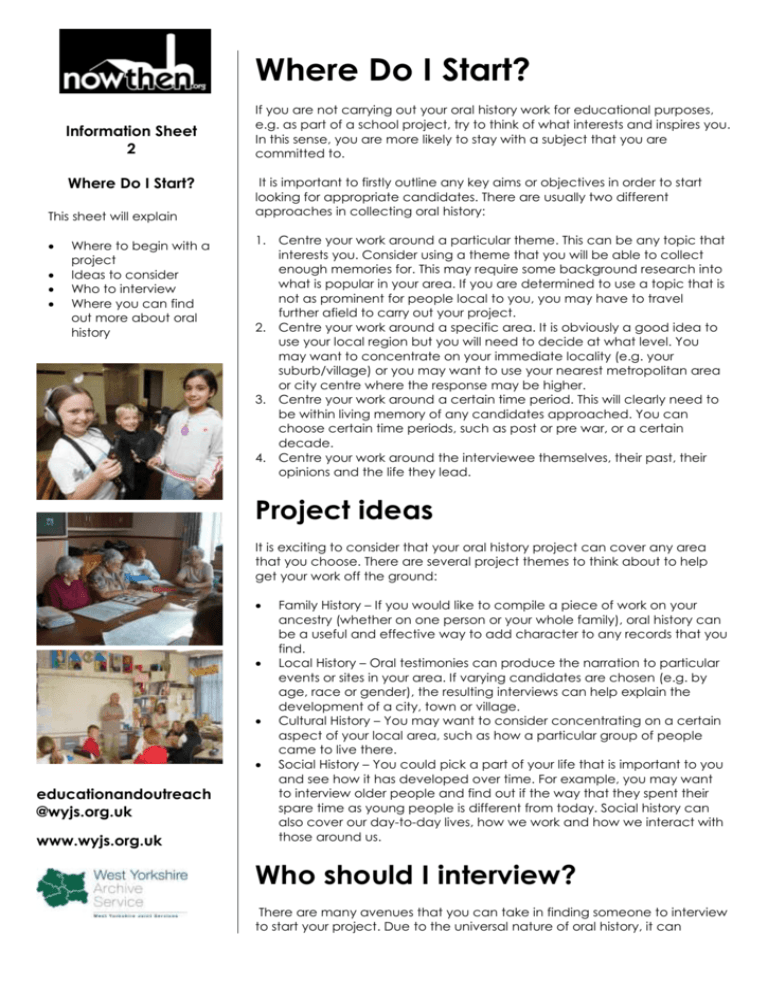
Where Do I Start? Information Sheet 2 Where Do I Start? This sheet will explain Where to begin with a project Ideas to consider Who to interview Where you can find out more about oral history If you are not carrying out your oral history work for educational purposes, e.g. as part of a school project, try to think of what interests and inspires you. In this sense, you are more likely to stay with a subject that you are committed to. It is important to firstly outline any key aims or objectives in order to start looking for appropriate candidates. There are usually two different approaches in collecting oral history: 1. Centre your work around a particular theme. This can be any topic that interests you. Consider using a theme that you will be able to collect enough memories for. This may require some background research into what is popular in your area. If you are determined to use a topic that is not as prominent for people local to you, you may have to travel further afield to carry out your project. 2. Centre your work around a specific area. It is obviously a good idea to use your local region but you will need to decide at what level. You may want to concentrate on your immediate locality (e.g. your suburb/village) or you may want to use your nearest metropolitan area or city centre where the response may be higher. 3. Centre your work around a certain time period. This will clearly need to be within living memory of any candidates approached. You can choose certain time periods, such as post or pre war, or a certain decade. 4. Centre your work around the interviewee themselves, their past, their opinions and the life they lead. Project ideas It is exciting to consider that your oral history project can cover any area that you choose. There are several project themes to think about to help get your work off the ground: educationandoutreach @wyjs.org.uk www.wyjs.org.uk Family History – If you would like to compile a piece of work on your ancestry (whether on one person or your whole family), oral history can be a useful and effective way to add character to any records that you find. Local History – Oral testimonies can produce the narration to particular events or sites in your area. If varying candidates are chosen (e.g. by age, race or gender), the resulting interviews can help explain the development of a city, town or village. Cultural History – You may want to consider concentrating on a certain aspect of your local area, such as how a particular group of people came to live there. Social History – You could pick a part of your life that is important to you and see how it has developed over time. For example, you may want to interview older people and find out if the way that they spent their spare time as young people is different from today. Social history can also cover our day-to-day lives, how we work and how we interact with those around us. Who should I interview? There are many avenues that you can take in finding someone to interview to start your project. Due to the universal nature of oral history, it can happen anywhere and can include anyone. In turn, this makes searching for interviewees easier. If the project is centred around ancestral history, members of the family are an obvious choice. For local historians, residents of the area are a suitable group to approach. Remember that the individuals you choose, dependent on your project topic, do not have to be older as the beauty of oral history is that the memories of younger generations will also be interesting to audiences now and in years to come. If the chosen person you have in mind is not a family member, it can be difficult to make contact with strangers. Advertising for willing volunteers in local newspapers and shops is sensible, as the choice to participate is left open. If the oral history project involves a particular grouping of people, it can be useful to contact any nearby community centres for interest. You may also want to consider getting in touch with a local radio station to mention your project on air and ask for any willing participants. Checking whether your area has its own community website is also a good idea, as these sites often list local groups and their meeting times and places. Approaching someone to interview Once you have chosen one or several individuals or groups to approach for your oral history project, it is best to contact them either in person or by telephone as it will appear more personal. This will give you the opportunity to fully explain who you are, what your project is all about and what you would like to talk to them about. Any correspondence by e-mail or letter will seem formal and the recipient may consider their letter or e-mail to be a circular and that you are have not selected them specifically to help with your work. Make your proposal to them informal. An official sit down interview can seem daunting, especially if your candidate may feel that they do not have anything useful to offer you. Invite them to have a chat with you about the themes your work will be based on and explain how they will be able to help you with this. It is essential that you persuade whoever you have chosen that their memories are important and central to the project you will be carrying out. If it is a whole group that you are pitching your idea to, it may be a good idea to prepare a quick five minute talk inviting any members to get involved. After all, it is that group or individual you have selected and if you make any candidate aware of this, it will go towards making them feel valued. For more information: The Oral History Society provides large amounts of information to follow, including the issues surrounding Ethics and Copyright: http://www.ohs.org.uk/index.php The British Library Sound Archive offers advice and in-depth descriptions of current and past projects: http://www.bl.uk/collections/soundarchive/nsa.html This article from the BBC website by Stephen Caunce is a good starting point for any oral historian: http://www.bbc.co.uk/history/trail/htd_history/oral/recording_oral_hist_01.shtml This information sheet is part of a series produced by the West Yorkshire Archive Service on Oral History. For a copy please visit www.wyjs.org.uk or nowthen.org. WYAS have also produced guides in other areas for a full list visit www.wyjs.org.uk






